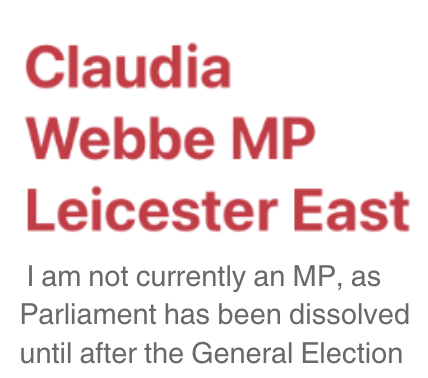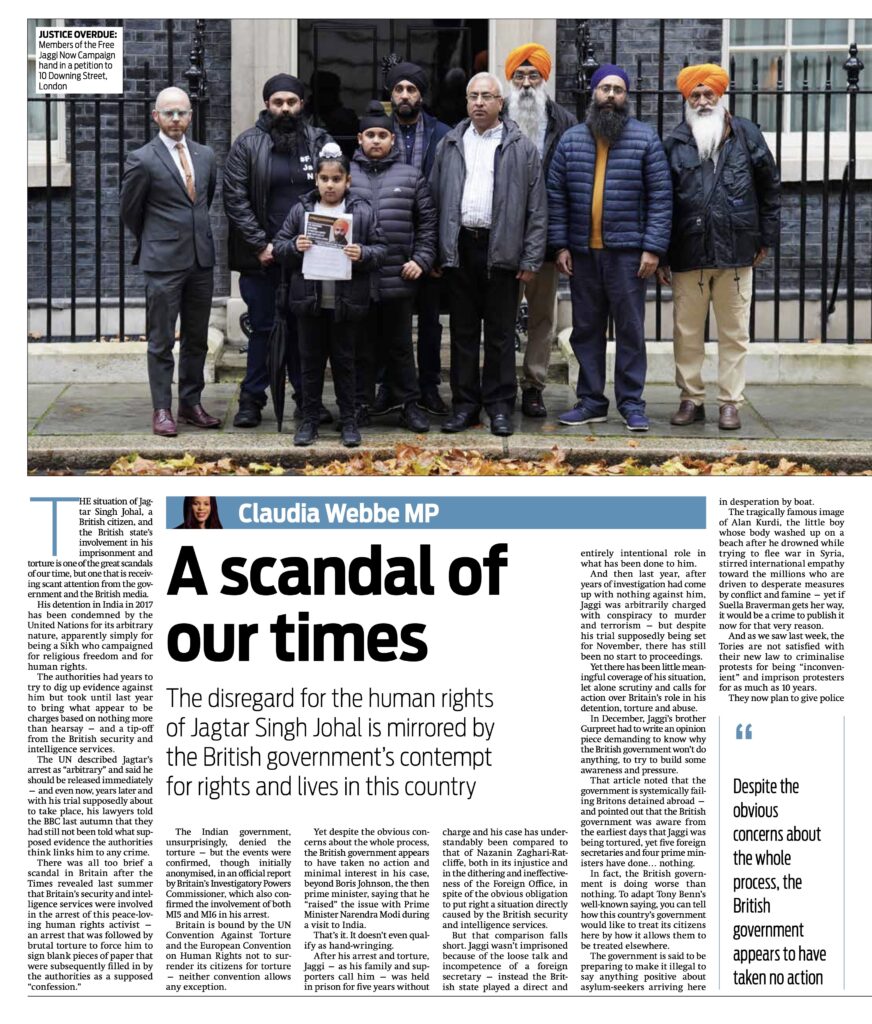A Scandal of our times
By Claudia Webbe MP
The disregard for the human rights of Jagtar Singh Johal is mirrored by the British government’s contempt for rights and lives in this country, says CLAUDIA WEBBE MP
The situation of Jagtar Singh Johal, a British citizen, and the British state’s involvement in his imprisonment and torture is one of the great scandals of our time, but one that is receiving scant attention from the government and the British media.
His detention in India in 2017 has been condemned by the United Nations for its arbitrary nature, apparently simply for being a Sikh who campaigned for religious freedom and for human rights.
The authorities had years to try to dig up evidence against him but took until last year to bring what appear to be charges based on nothing more than hearsay — and a tip-off from the British security and intelligence services.
The UN described Jagtar’s arrest as “arbitrary” and said he should be released immediately — and even now, years later and with his trial supposedly about to take place, his lawyers told the BBC last autumn that they had still not been told what supposed evidence the authorities think links him to any crime.
There was all too brief a scandal in Britain after the Times revealed last summer that Britain’s security and intelligence services were involved in the arrest of this peace-loving human rights activist — an arrest that was followed by brutal torture to force him to sign blank pieces of paper that were subsequently filled in by the authorities as a supposed “confession.”
The Indian government, unsurprisingly, denied the torture — but the events were confirmed, though initially anonymised, in an official report by Britain’s Investigatory Powers Commissioner, which also confirmed the involvement of both MI5 and MI6 in his arrest.
Britain is bound by the UN Convention Against Torture and the European Convention on Human Rights not to surrender its citizens for torture — neither convention allows any exception.
Yet despite the obvious concerns about the whole process, the British government appears to have taken no action and minimal interest in his case, beyond Boris Johnson, the then prime minister, saying that he “raised” the issue with Prime Minister Narendra Modi during a visit to India.
That’s it. It doesn’t even qualify as hand-wringing.
After his arrest and torture, Jaggi — as his family and supporters call him — was held in prison for five years without charge and his case has understandably been compared to that of Nazanin Zaghari-Ratcliffe, both in its injustice and in the dithering and ineffectiveness of the Foreign Office, in spite of the obvious obligation to put right a situation directly caused by the British security and intelligence services.
But that comparison falls short. Jaggi wasn’t imprisoned because of the loose talk and incompetence of a foreign secretary — instead the British state played a direct and entirely intentional role in what has been done to him.
And then last year, after years of investigation had come up with nothing against him, Jaggi was arbitrarily charged with conspiracy to murder and terrorism — but despite his trial supposedly being set for November, there has still been no start to proceedings.
Yet there has been little meaningful coverage of his situation, let alone scrutiny and calls for action over Britain’s role in his detention, torture and abuse.
In December, Jaggi’s brother Gurpreet had to write an opinion piece demanding to know why the British government won’t do anything, to try to build some awareness and pressure.
That article noted that the government is systemically failing Britons detained abroad — and pointed out that the British government was aware from the earliest days that Jaggi was being tortured, yet five foreign secretaries and four prime ministers have done… nothing.
In fact, the British government is doing worse than nothing. To adapt Tony Benn’s well-known saying, you can tell how this country’s government would like to treat its citizens here by how it allows them to be treated elsewhere.
The government is said to be preparing to make it illegal to say anything positive about asylum-seekers arriving here in desperation by boat.
The tragically famous image of Alan Kurdi, the little boy whose body washed up on a beach after he drowned while trying to flee war in Syria, stirred international empathy toward the millions who are driven to desperate measures by conflict and famine — yet if Suella Braverman gets her way, it would be a crime to publish it now for that very reason.
And as we saw last week, the Tories are not satisfied with their new law to criminalise protests for being “inconvenient” and imprison protesters for as much as 10 years.
They now plan to give police power to clamp down on protests on the grounds that they might become an inconvenience — and to stop, search, detain and ban anyone they think might be associated with a protest that hasn’t even started yet.
The government’s refusal to act to help Jagtar Singh Johal and others is a horrific abdication, for the sake of trade and profit, of its primary duty to protect British citizens, including those abroad — all the more so when the British state has played a direct role in the harm done to them.
But that attitude is mirrored in the government’s behaviour toward British citizens at home as well — which is just as driven by profit.
And just as the British state played an active role in the targeting, arrest and ultimately the torture of Jagtar, it is the key actor in the assault already well under way on our rights, freedoms and living standards here.
The political class’s contempt for wellbeing and indifference to injustice that lies at the heart of what is being done to Jaggi and others is the same foundation for the mass attack on our freedoms in this country: to protest; to strike; to resist when government exceeds its bounds; to live free from hunger and fear and to build a decent life for ourselves and our children.
Inaction has never been good enough. Silence is not good enough. And that doesn’t just apply to government and the media, but to all of us.
We are faced with a political class that is willing both to ignore the abuse and imprisonment of our people in countries where human rights are regarded cheaply if at all — and to weaken and undermine our rights and freedoms here — the only sane and acceptable response is to resist and to demand better until we have it.
We need to meet media silence with noise. We need to meet inaction with action. And we need to meet contempt for and attacks on our humanity and our rights with an absolute, intransigent No: in the political sphere, in the workplace and where necessary in the streets.
British governments often refer to their most important duty as being that of protecting British citizens. It’s time for that to be seen in action, not just talk.
For the sake of Jagtar Singh Johal and for ourselves we must settle for nothing less than immediate and decisive action from the government.
Whether that’s on behalf of Jagtar and every other wrongly detained British citizen abroad, or in the abandonment of the Establishment’s attacks on us and the rebuilding of what’s been vandalised and destroyed by those in power, it has to be now.
Claudia Webbe MP is the member of Parliament for Leicester East. You can follow her at www.facebook.com/claudiaforLE and twitter.com/ClaudiaWebbe



